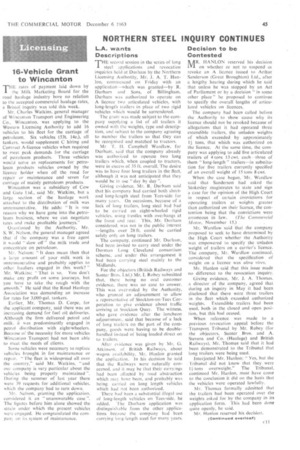16-Vehicle Grant to Wincanton
Page 47

If you've noticed an error in this article please click here to report it so we can fix it.
THE rates of payment laid down by the Milk Marketing Board for the road haulage industry bore no relation to the accepted commercial haulage rates, a Bristol inquiry was told this week.
Mr. Charles Watkins, general manager of Wincanton Transport and Engineering Co., Wincanton, was applying to the Western Licensing Authority to add 16 vehicles to his fleet for the carriage of petroleum. Six vehicles (53t. 14c.), all tankers, would supplement C hiring and Contract A-licence vehicles when required to meet peak demands for the carriage of petroleum products. Three vehicles would serve as replacements for petroleum products vehicles owned by the licence holder when off the road for repair or maintenance and seven for carriage of mainly petroleum products.
Wincanton was a •subsidiary. of Cow and Gate lad., said Mr. Watkins, but a large section. of the haulage work attached to the distribution of milk was unremunerative. He adds: "It is one reason why we have gone into the petroleum business, where We can negotiate rates and make profitable journeys."
Questioned by the • Authority, Mr. S. W. Nelson, the general manager agreed that if the company was a free agent it would " slow off" the milk trade and concentrate on petroleum.
Mr. Nelson: " It does mean then that a large amount of your milk work is unremunerative and probably applies to other hauliers engaged in this work? " Mr. Watkins: "That is so. You don't make any profit on some journeys, but you have to take the rough with the smooth." He said that the Road Haulage Association was demanding an increase for rates for 3,000-gal. tankers.
Earlier, Mr. Thomas D. Corpe, for the applicant company, said there was an increasing demand for fuel oil deliveries. Although the firm delivered petrol and milk, ii was predominantly engaged in petrol distribution with eight-wheelers. Because of the necessity for more vehicles Wincanton Transport had not been able to meet the needs of clients.
Some vehicles were necessary to replace vehicles brought in for maintenance or repair. "The fleet is widespread all over the country," said Mr. Watkins, "and our company is very particular about the vehicles being properly maintained ". During the summer of last year there were 39 requests for additional vehicles, which the company had to turn down.
Mr. Nelson, granting the application, considered it an "unanswerable case ". The figures before him alone showed the strain tinder which the present vehicles were engaged. He congratulated the cornpans on its system of maintenance.




























































































































